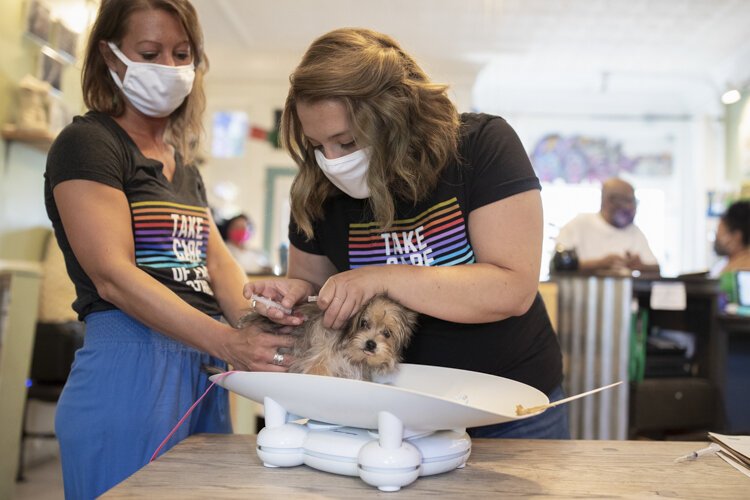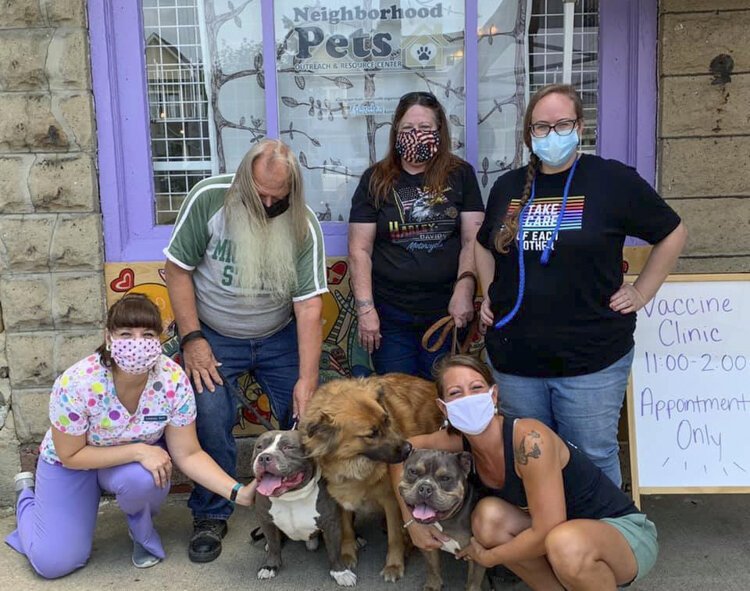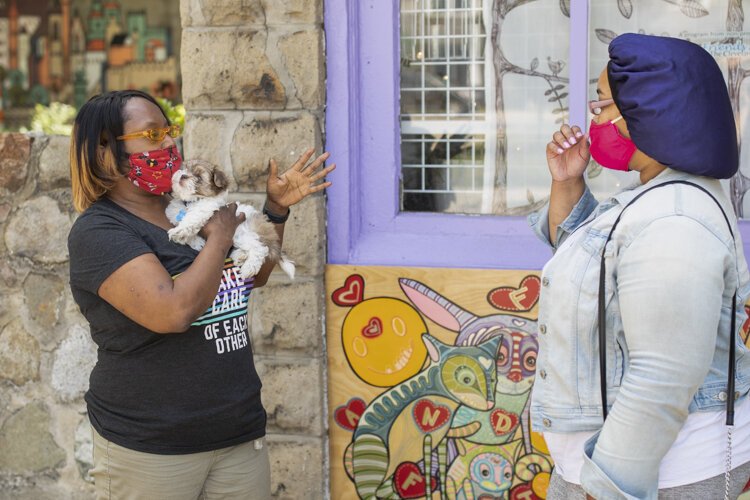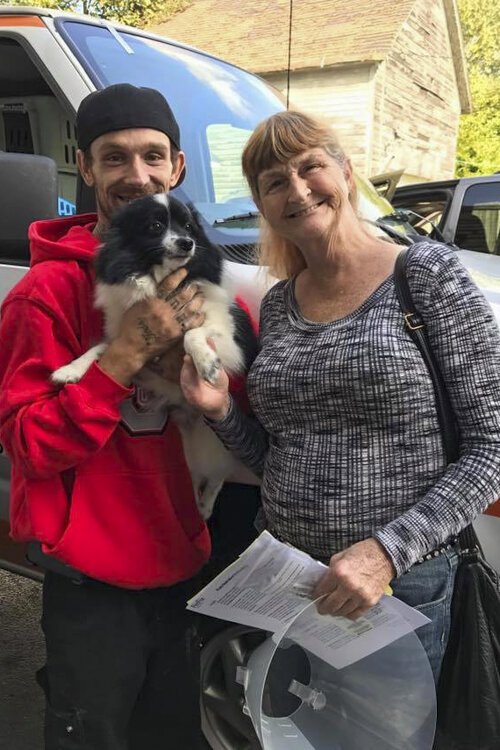All in the family: Neighborhood Pets ensures every family member is cared for
Becca Britton goes into work each day with the motto, “take care of each other.” As executive director of Neighborhood Pets, 3711 E. 65th St. in Slavic Village, Britton knows that motto spans beyond just taking care of humans. At the nonprofit organization, pets are just as important as the owners who care for their furry companions. And income level should not be a barrier to owning and caring for a pet, says Britton.
“Traditionally, low income pet owners are judged negatively and seen as ‘neglecting’ their pets, simply because they can't afford traditional vet care,” says Britton. “Pet owners have been shamed for asking for help or talked into surrendering their pets because they can't afford vet care.”
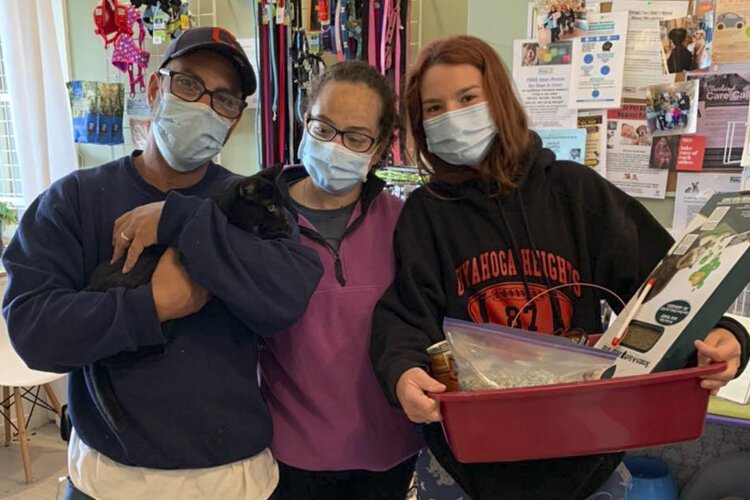 Neighborhood has served more than 3,500 people with its pet food bank, low cost vet clinic, and spay/neuter program.Neighborhood Pets, founded in October 2016 as a program under Friends of the Cleveland Kennel before the entire organization became Neighborhood Pets this past June, works to keep pets with their human companions by providing low cost medical care, free neutering and spaying, affordable food and supplies, and other services to pet owners.
Neighborhood has served more than 3,500 people with its pet food bank, low cost vet clinic, and spay/neuter program.Neighborhood Pets, founded in October 2016 as a program under Friends of the Cleveland Kennel before the entire organization became Neighborhood Pets this past June, works to keep pets with their human companions by providing low cost medical care, free neutering and spaying, affordable food and supplies, and other services to pet owners.
The organization’s services are open to any pet owner, but memberships are available only to residents of Cleveland and East Cleveland with total household incomes of less than 150% of federal poverty guidelines. Nonmembers can purchase food, supplies, flea prevention medication at a higher cost that also supports the work on Neighborhood Pets.
“We wanted to focus our work on the greatest need, which was to help pets stay in their homes by providing them accessible resources,” says Britton, adding that since the organization’s inception it has served more than 3,500 people with its pet food bank, low cost vet clinic, and spay/neuter program.
She says the work done at Neighborhood Pets starts with building relationships—and developing trust—with the clients the team serves.
“Knowing that there are so many Cleveland pet owners struggling just to care for themselves, and knowing they prioritize their pets over their own needs is extremely moving to me,” Britton says. “We are the resource for so many people who struggle financially who have become accustomed to hearing the words ‘no’ or ‘sorry, we can’t help you.’”
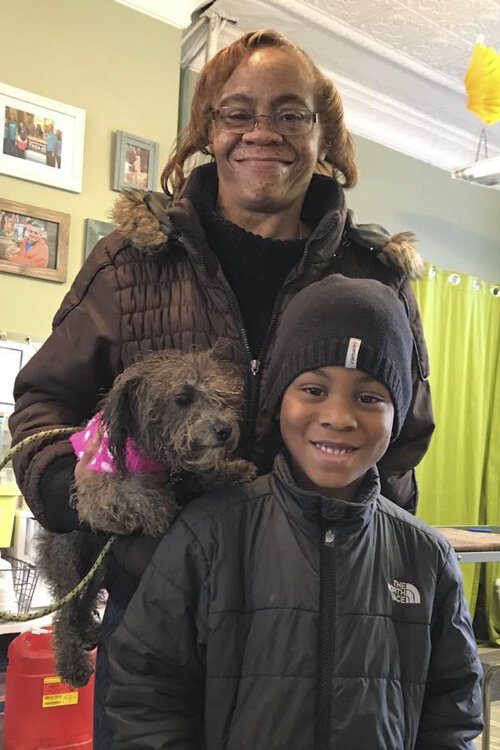 Neighborhood has served more than 3,500 people with its pet food bank, low cost vet clinic, and spay/neuter program.Britton says the staff at Neighborhood Pets want to be the people who tell pet owners “we can help you,” instead of turning them away.
Neighborhood has served more than 3,500 people with its pet food bank, low cost vet clinic, and spay/neuter program.Britton says the staff at Neighborhood Pets want to be the people who tell pet owners “we can help you,” instead of turning them away.
“These words [‘we can’t help you’] are devastating when it relates to their beloved companion staying alive and staying with them,” Britton explains. “It is extremely important to me, and our team, to never use those words, and instead provide accessible resources—and most of all, treat those in need with kindness and compassion. Financial status should not dictate how you are treated or respected. Sadly, that is the reality many [people] experience.”
Friends of the Cleveland Kennel began hosting pop-up Canine Wellness Days—offering free vaccines and then adding shots, ID tags, microchips, flea treatments, leashes and collars, and vouchers for free spay/neutering.
“We had 500 to 700 pets come through [the wellness clinic],” recalls Britton. “People would stand and wait in the pouring rain, the 90-degree heat. They would stand in line for hours just to get free shots.”
The volunteers and participating organizations saw the momentum and need building, so in 2016 Neighborhood Pets evolved out of the events into a permanent resource center.
Neighborhood Pets works with a variety of area agencies and organizations, including Slavic Village Development, University Settlement, various veterinary clinics, and the May Dugan Center, and often connect their clients with addition social services at their visits.
“For most of our clients, their pets are all that they have as their support system,” says Britton. “We have experienced that by providing the pet owner with much needed resources for their beloved pet—it not only helps the animals but also makes an impact in the owners’ mental and physical health.”
In addition to its regular fundraising efforts, Neighborhood Pets is currently running a COVID-19 Relief Fund campaign to keep its services open and running during the pandemic. Britton points out that many veterinary clinics are not accepting new clients right now because they are at capacity. She says half of the organization’s clients are over the age of 50, and many are coping with mental illness or addiction.
“Their pets are important to them,” she says. “Even more than a typical household.”


